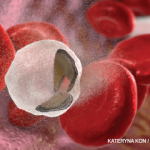Chronic inflammation can lead to microvascular dysfunction even in lupus patients who have no typical cardiovascular risk factors or symptoms. These patients may have a reduced coronary flow reserve in response to stress testing, as a 2009 study showed, said Dr. Manzi.4 In the study seven of 25 women with lupus or rheumatoid arthritis showed ischemic changes on their electrocardiograms, even in the setting of minimal or no epicardial coronary artery disease. “These changes were associated with increased disease activity. When you treat the patient’s disease, or when disease is inactive, you may see a reversal.”
Multiple Mechanisms
Several mechanisms may play a role in coronary microvascular dysfunction in SLE patients, said Dr. Manzi.
“There appears to be impaired microvascular dilation, which should happen during stress testing, where there should be increased hyperemia,” she said. Patients may also have increased microvascular constriction. Treatments with calcium-channel blockers or angiotensin-converting enzyme (ACE) inhibitors have shown mixed results. Rheumatologists should evaluate patients who may have angina-like chest pain, but normal coronary arteries, and consider various agents to treat their microvascular disease or simply reduce pain perception, she said.
Infections may set off an inflammatory reaction like acute myocarditis in lupus patients, who may present with symptoms like chest pain, heart failure or tachyarrhythmias. These problems may resolve, persist or progress and result in myocardial scarring. Myocarditis induced by viral infections like chlamydia, coxsackie, parvovirus, herpes or cytomegalovirus is more common in the U.S., but bacterial and fungal infections are possible culprits, too.5
“Always do an endomyocardial biopsy in the setting of unexplained, new-onset heart failure of less than two weeks or up to three months, particularly if the patient has arrhythmias,” she said. Cardiac MRI is useful to diagnose non-infectious lupus myocarditis. Imaging often shows abnormalities in the myocardium, pericardium and endocardium, suggesting pancarditis in these patients.
“Fortunately, with treatment, you can often see improvement. That’s why I like cardiac MRIs, because you can use them to follow response to therapy,” said Dr. Manzi. Treatments include ACE inhibitors or diuretics, and corticosteroids are the mainstay therapy to reduce the inflammation. Other options are mycophenolate mofetil, azathioprine and cyclosporine, and intravenous immunoglobulin (IVIG) if viral causes are suspected, she said. Rheumatologists should be aware that some drugs may cause myocardial toxicity, including cocaine, ethanol and antimalarials.6
Autoimmune Anemia & Thrombocytopenia

Dr. Gernsheimer
About 10% of lupus patients may develop autoimmune hemolytic anemia (AIHA), so overall, it is a relatively rare syndrome, said Terry B. Gernsheimer, MD, professor of medicine at the University of Washington in Seattle.7 Available clinical data on AIHA are not specific to lupus, she said. About 75% of people with AIHA present with anemia at first, and it may be “a waxing and waning disease.”


